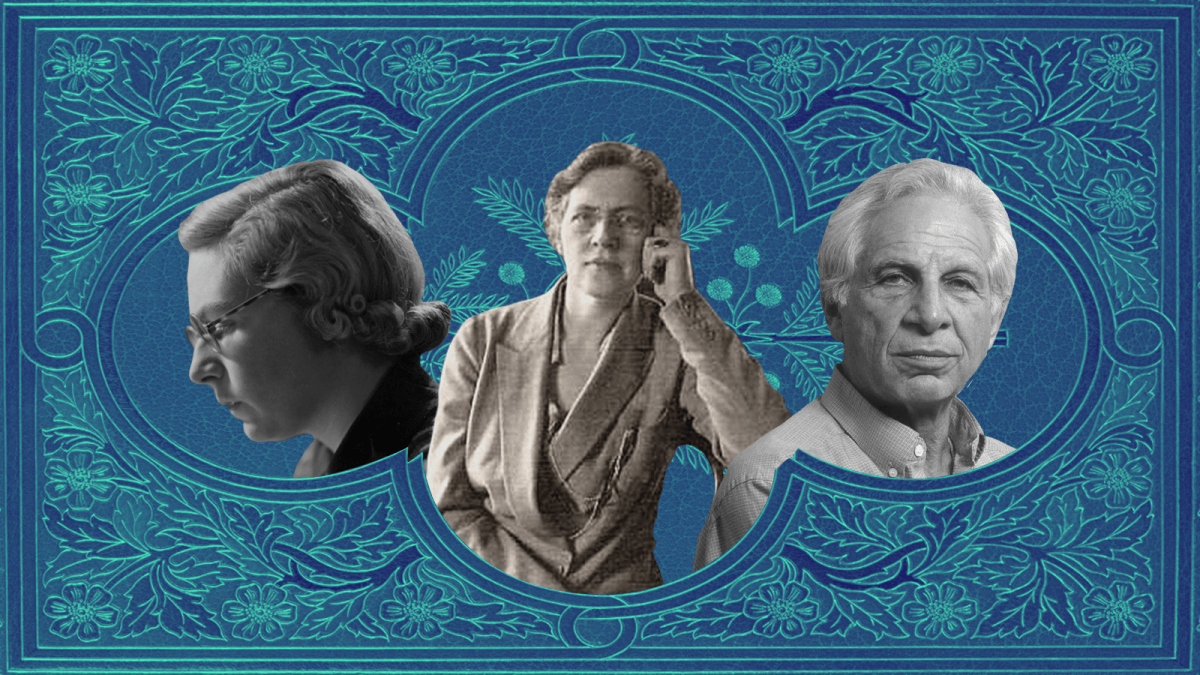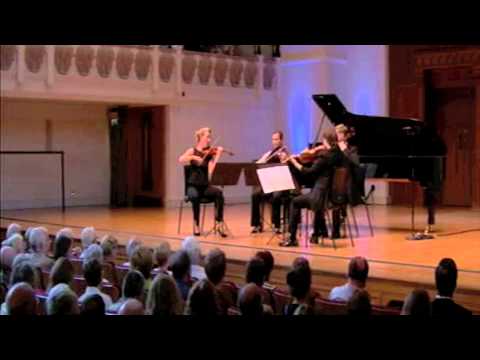- Alexander Goehr and Jack Van Zandt, Alexander Goehr, Composing a Life: Teachers, Mentors, and Models (Carcanet)
- Erica Siegel: The Life and Music of Elizabeth Maconchy (Boydell & Brewer)
- James Whipple Miller Nadia Boulanger: War Years in America and Her Last Decades (Chestnut Hill Press)
“As I have said on many occasions,” the composer Alexander Goehr begins the fourth chapter of his book with Jack Van Zandt, “I believe that, for the most part, the period of time when a teacher or mentor has an influential relationship with a young composer is short and typically compressed into a time span of a few months.” Goehr, 91, is describing (and echoing) Pierre Boulez, a mentor with whom he spent a lot of time arguing. “I always felt that I was wrong and he was right, in spite of disagreeing with him, which is the indication of a complicated relationship,” Goehr writes. They argued about Schoenberg and Stravinsky, about the merits of Schoenberg’s follower (and Boulez’s teacher) René Leibowitz, and on Boulez’s outright dismissal of whole tranches of music from the past. And yet, reflecting back, the arguments and their raison d’être—to be constantly questioning, rather than believing—fundamentally shaped Goehr’s musical life. “Even today,” Goehr writes later on, “I often think when I am composing: ‘What would Pierre say about that?’”
While describing his time with Boulez, Goehr (an important educator himself, through posts at Southampton, Leeds, and Cambridge universities) points to the double-bind of influence in the teaching of composition: a precise, direct, present transmission through focused study and discussion, coupled with a vague, indirect, longer molding of life in absentia that can only really be understood at a later date. Goehr, the last surviving member of the “New Music Manchester” group of Peter Maxwell Davies, Harrison Birtwistle, Alan Hacker, John Ogdon, and others, highlights the latter half in descriptions of his studies with Olivier Messiaen. “For many years, I was quite cynical and blasé… I didn’t quite realize what it was all about because I had my own agenda which was quite different,” he writes of Messiaen. In works like the “Little Symphony” and the Brechtian opera “Arden Must Die,” Goehr would eventually consolidate his own individual synthesis of serialism and modalism, but the main lesson from Messiaen would only reveal itself when a similar situation presented itself again. “In Darmstadt, the sounding like everybody else was almost like having a party badge or a uniform. And you either wore that badge or else,” Goehr writes, like he’d already received this lesson but was only just learning it.
How do we understand the influence of a composition teacher on a student once formal training is at an end? One way is to deny that that relationship ever ends at all. The co-author of Composing a Life, Jack Van Zandt, treads a careful, interesting route through Goehr’s preoccupations with tradition, his use of historic models as a means, his Zen-like approach to the ritual of composing every day, and his key musical relationships; alongside Schoenberg, there’s a section on an American excursion with Copland, Carter, and Babbitt, Goehr’s interest in the work of Bach scholar Ulrich Siegele, and on Richard Hall, the formative teacher at the Manchester School of Music. But underscoring all this is Van Zandt’s proximity to Goehr. A former apprentice of Goehr’s at Cambridge University, Van Zandt, now a composer and teacher himself, was his assistant from from 1978 to 1985, a formal relationship that ended after the premiere of Goehr’s opera “Behold the Sun” at the Deutsche Oper am Rhein in 1985. Though it wasn’t really the end, as he sees it. “My position as Sandy’s pupil did not end in 1985, and it never will,” Van Zandt writes. The relationship Van Zandt creates with Goehr on the page is a beautifully sustained world of ideas and inquiry, though what emerges is a fundamental imbalance, between a subject with a large number of formative “afters,” and a student with few.
The latest from VAN, delivered straight to your inbox
What came after Elizabeth Maconchy’s tuition at the Royal College of Music ought to have been similarly formative. But where Van Zandt and Goehr speak naturally of models, ideas, and philosophical debate (a key part of Van Zandt’s “apprenticeship” came through dinner parties organized by Goehr with composers, performers, academics, and publishers), Maconchy’s biographer Erica Siegel describes just how many practical hurdles the composer faced in getting to the stage where a similar situation was unquestionable. “Unfortunately, the experience and stimulus of performance are an essential part of the growth and development of a composer – it is not only a matter of ‘getting known,’” Maconchy lamented in 1961. The story Siegel outlines is of the sheer hard work of advocating for oneself, and the hard work required to prove to others one’s ability to think in such artistic ways.
Maconchy’s story also shows the importance of the composition teacher as an advocate after the fact. In 1925, she began her studies with Ralph Vaughan Williams at the RCM. “Everything suddenly opened out to me,” she gushed. “It was a whole new world when I became a pupil of his, not so much from his teaching as just from him as a person, his attitude to music, he was a tremendously inspiring person.” Maconchy would outgrow the early Vaughan Williams influences in her works, writing her cycle of 13 fierce string quartets, and an orchestral breakthrough with “The Land.” But just as she had entered new rooms—Proms performances, BBC broadcasts—Maconchy needed help staying in them.
Though her old teacher would downplay the art of lobbying— “I’m not very good at pushing, as you know,” he told composer and Maconchy’s close friend Grace Williams in the mid 1940s—Vaughan Williams nevertheless became a strong advocate for Maconchy’s music. “For those of us who really know her stuff, there is more sense of beauty in her little finger than there is in lots & lots of contemporary composers put together…” he said in a letter to the BBC Symphony Orchestra’s assistant conductor Clarence Raybould in 1943, asking if he’d ever conducted anything of Maconchy’s. Siegel relays a number of times where Vaughan Williams, in spite of his declining status in Britain’s musical life, used his influence to lobby for Maconchy’s music in times of struggle. That form of advocacy after the fact seemed to move Maconchy; taking on high-level administrative roles with advocacy groups like Composers’ Guild of Great Britain and the Society for the Promotion of New Music passed on that support in turn.
Rather than advocacy, the relationship between the great teacher Nadia Boulanger and Ruth Robbins, a theory student in a class Boulanger taught at Longy School of Music after fleeing France in 1940, initially seemed like one of lop-sided support. As early as 1944, Robbins took to sending Boulanger care packages of practical, inexpensive stuff she had lying around the house, something she continued when Boulanger returned to France after the war. Boulanger always replied graciously, but one wonders how she must have reacted as she opened parcels of socks and fishhooks in the post from an American student thousands of miles away.
“Robbins’s value to Boulanger was clearly unrelated to cultural capital,” James Whipple Miller writes rather brutally about his aunt. “Robbins was of mediocre talent as a musician. She was not wealthy, well-known, or well-connected.” And yet, “despite lack of sophistication or musical talent, Robbins struck a chord in Boulanger’s heart. Why and how did that happen?” he asks. The key is in another form of afterness, where the teacher-pupil relationship morphs into a friendship made up of traveling, favors, humor, and emotional sustenance. There were trips to the Pyrenees and Rome; they traded melancholia as loved ones died; in America, Robbins would schedule Boulanger’s pupils in Chicago, and was happy to drive her around to her many engagements in the U.S. (Once, Robbins drove Boulanger to the White House to have dinner with Jackie Kennedy, and waited patiently outside the gates in her cute little VW.) “The stimulation and enjoyment of being with Boulanger was more than enough recompense,” Miller writes. It’s a strange friendship, but aren’t all friendships necessarily strange?
In 1979, Robbins wrote her final letter to Boulanger, a birthday message on her friend’s 92nd birthday. Robbins was moving from Massachusetts to California, leaving as much behind as possible, but couldn’t bear to part with one item: a collection of rocks Boulanger had collected in Santa Barbara. Robbins would outlive her friend by more than 25 years, and would regale her family with stories of adventures with the starry French musician. But hidden somewhere in her California home was the truest gift from teacher to student: a bowl of rocks, impossible to throw away. ¶
Subscribers keep VAN running!
VAN is proud to be an independent classical music magazine thanks to our subscribers. For just over 10 cents a day, you can enjoy unlimited access to over 875 articles in our archives—and get new ones delivered straight to your inbox each week.
Not ready to commit to a full year?
You can test-drive VAN for one month for the price of a coffee.


